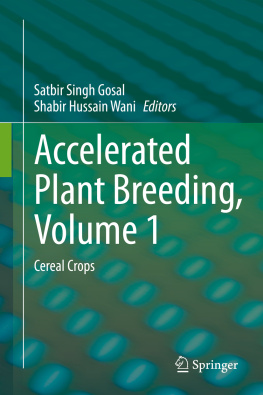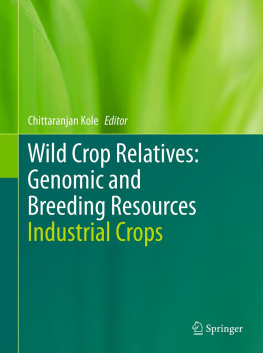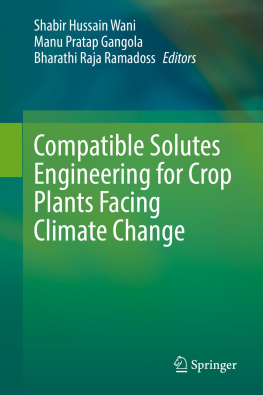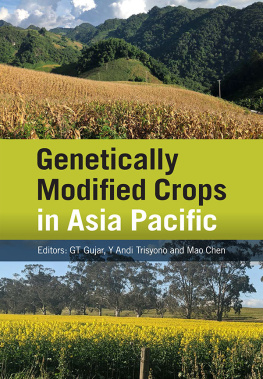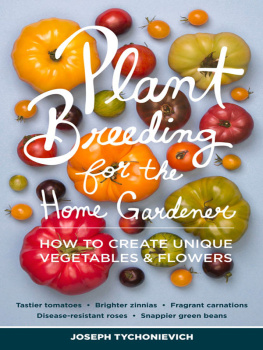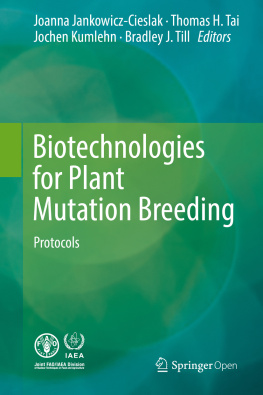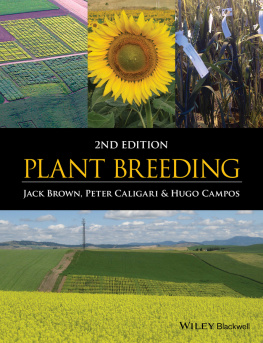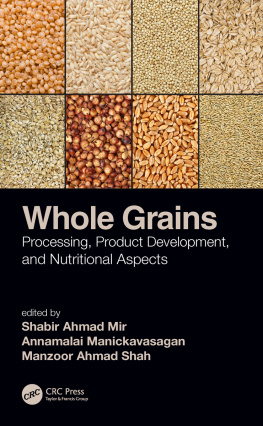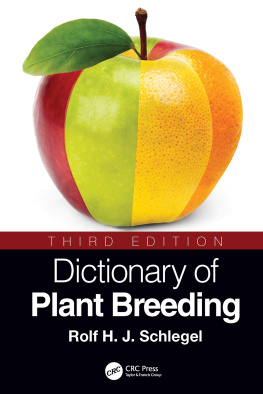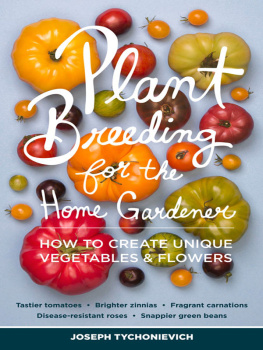Shabir Hussain Wani (editor) - Accelerated Plant Breeding, Volume 1 : Cereal Crops
Here you can read online Shabir Hussain Wani (editor) - Accelerated Plant Breeding, Volume 1 : Cereal Crops full text of the book (entire story) in english for free. Download pdf and epub, get meaning, cover and reviews about this ebook. year: 2020, publisher: Springer International Publishing, genre: Art. Description of the work, (preface) as well as reviews are available. Best literature library LitArk.com created for fans of good reading and offers a wide selection of genres:
Romance novel
Science fiction
Adventure
Detective
Science
History
Home and family
Prose
Art
Politics
Computer
Non-fiction
Religion
Business
Children
Humor
Choose a favorite category and find really read worthwhile books. Enjoy immersion in the world of imagination, feel the emotions of the characters or learn something new for yourself, make an fascinating discovery.
- Book:Accelerated Plant Breeding, Volume 1 : Cereal Crops
- Author:
- Publisher:Springer International Publishing
- Genre:
- Year:2020
- Rating:3 / 5
- Favourites:Add to favourites
- Your mark:
- 60
- 1
- 2
- 3
- 4
- 5
Accelerated Plant Breeding, Volume 1 : Cereal Crops: summary, description and annotation
We offer to read an annotation, description, summary or preface (depends on what the author of the book "Accelerated Plant Breeding, Volume 1 : Cereal Crops" wrote himself). If you haven't found the necessary information about the book — write in the comments, we will try to find it.
Accelerated Plant Breeding, Volume 1 : Cereal Crops — read online for free the complete book (whole text) full work
Below is the text of the book, divided by pages. System saving the place of the last page read, allows you to conveniently read the book "Accelerated Plant Breeding, Volume 1 : Cereal Crops" online for free, without having to search again every time where you left off. Put a bookmark, and you can go to the page where you finished reading at any time.
Font size:
Interval:
Bookmark:
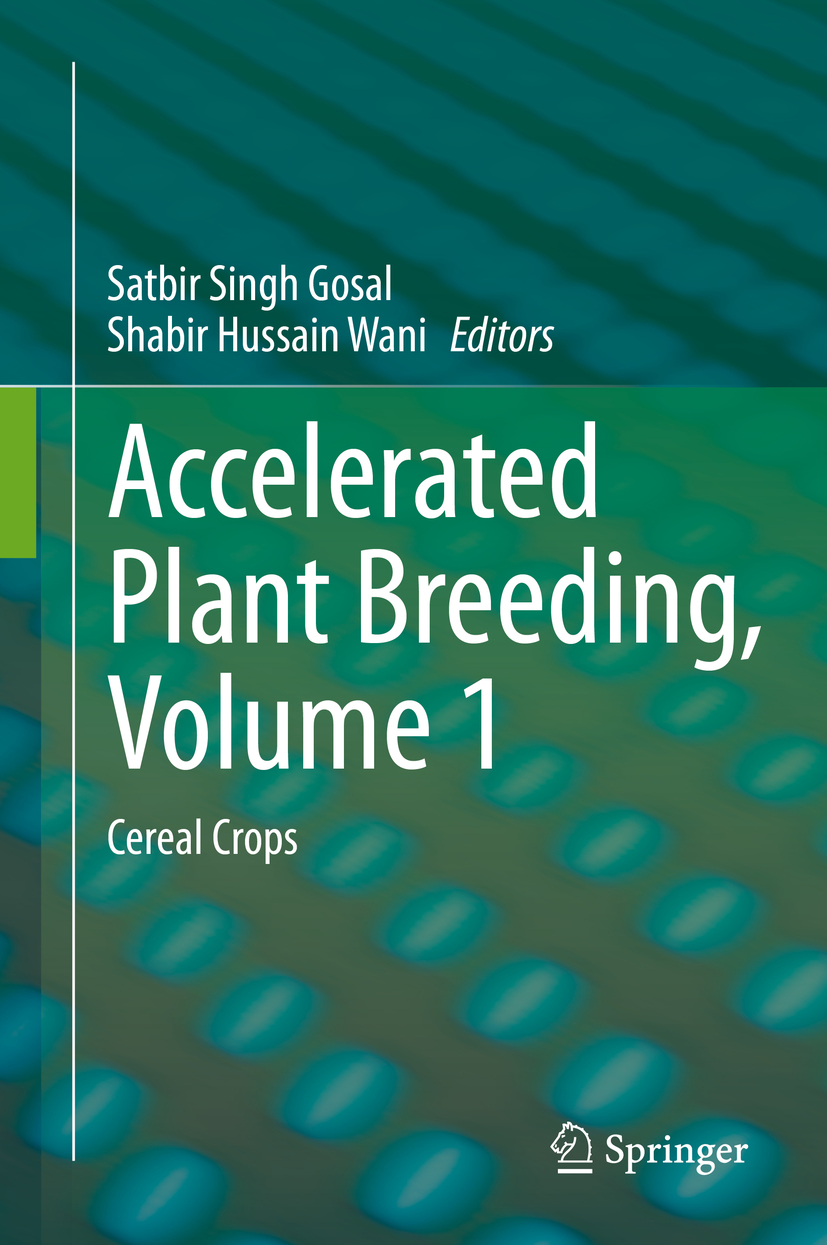

This Springer imprint is published by the registered company Springer Nature Switzerland AG
The registered company address is: Gewerbestrasse 11, 6330 Cham, Switzerland
This book is dedicated to Dr. Gurdev Singh KhushAn acknowledged hero of rice revolution.
The plant breeding started with the process of selection which led to the domestication of about 500 plant species through centuries as a maiden act of artificial selection of plants for human consumption. Such a form of plant breeding started simply as an art because little was known about the scientific basis of the plant traits. Over the years, plant breeding was put on sound scientific basis all the way through contributions from Mendelian genetics. Plant breeding which was earlier considered art and science for changing and improving the characteristics of plants is now greatly reliant on science. Plant breeding methods such as selection, hybridization, polyploidy, and induced mutations lead into superior crop varieties with high yield, quality, and resistance to biotic/abiotic stresses. The world food grain production, which was 918 million tons during 1961, has been enhanced to 3076 million tons during 2017. Similarly, the world population which was 3070 million in 1961 increased to 7600 million in 2017. During this period, the food grain production increase (235.08%) was more as compared to population increase (147.56%). Thus, the per capita food grain production (2.99 qtls. in 1961) has been enhanced to 4.05 qtls. in 2017. The development and release of high yielding crop varieties and hybrids has played a major role in increasing food grain production world over. In the current scenario of changing climate and WTO, farmers desire for new varieties, suitable not only for local consumption but also for export purposes. The pursuit for sustainable agriculture can benefit greatly from powerful new technologies that accelerate the process of plant breeding.Accelerated Plant Breeding: Cereal Crops, edited by Drs. Satbir Singh Gosal and Shabir Hussain Wani, is aimed to describe the innovative methods which supplement/complement the conventional breeding methods for precision and accelerated crop improvement. The book includes chapters prepared by specialists and subject experts on different cereal crops/aspects in relation to accelerated breeding. The first chapter introduces various methods/technologies currently being used to accelerate the breeding process for early release of varieties. Further specific chapters dealing with data management and advanced quantitative genetics technologies have been included. Recent speed breeding and genomic selection methods have been described in separate chapters. Besides, chapters dealing with accelerated breeding of major cereal crops such as rice, bread and durum wheat, maize, barley, finger millet, barnyard millet, and sorghum have been included. Thus, this volume provides state-of-the-art information on new innovative methods/technologies which hold significant promise to speed up the process of plant breeding. I feel that this book will be very useful for students, research scholars, plant breeders, and scientists working in the areas of genomics, cellular/molecular biology, and biotechnology. I congratulate the editors of this book Dr. S.S. Gosal and Dr. Shabir Hussain Wani for getting valuable contributions from the selected experts working on important cereal crops.
Plant breeding is a continuous process which results into new crop varieties with improved characteristics. In the current scenario of climate change and global warming, there is rapid emergence of new races of insect-pests and new pathotypes of disease-causing agents. Minor insect-pests/pathogens are rapidly emerging as major ones. Heat and drought stresses are becoming serious threats. Under current WTO regime, farmers desire new high yielding varieties not only for local consumption but also for export purposes. Thus, plant breeders have to constantly develop new stainable varieties with high yield, quality, resistance to diseases and insect-pests, and tolerance to abiotic stresses. Now, the cultivator also demands for high yielding varieties possessing durable and multiple disease resistance, early maturity, higher harvest index, dual purpose forages, varieties with nutrient-use efficiency/water-use efficiency, wider adaptability, suitable for mechanized harvesting, with better shelf life, better processing quality, with improved minerals, vitamins, amino acids, proteins, antioxidants, and bioactive compounds. Using conventional approaches, in a self-pollinated crop like wheat, it takes about 1012 years for the development and release of the new variety. Therefore, an efficient improvement in the existing cultivars is necessary to meet the challenge and rising food demand. The quest for sustainable agriculture can benefit greatly from powerful new technologies that accelerate plant breeding. In the current era of Breeding 4.0, where specific parts in the genome can be targeted, technological advances along with the data revolution greatly improve the capacity of plant geneticists and breeders to develop durable varieties. Therefore, this book will be highlighting the innovative techniques/technologies such as doubled haploidy, micropropagation, somaclonal variation, embryo culture, marker-assisted selection, marker-assisted background selection, genomic selection, high-throughput genotyping, high-throughput phenotyping, reverse breeding, transgenic breeding, shuttle breeding, speed breeding, genome editing, advanced quantitative genetics technologies, and intentional and standardized data management presently being used to supplement/complement the conventional approaches for accelerating plant breeding. This volume provides an authoritative review account of various innovative methods/approaches and improvement in important cereal crops that has been made in the recent past. The book includes chapters prepared by specialists and subject experts on different crops/aspects in relation to accelerated breeding. The first chapter introduces various methods/technologies currently being used to accelerate the breeding process for early release of varieties. An imperative chapter dealing with data management and advancements in data analytics has been especially included. Likewise, advanced quantitative genetics technologies for accelerating plant breeding have been included in separate chapter. Speed breeding and genomic selection methods have been described in separate chapters. Two chapters exclusively deal with rapid improvement in rice. Likewise, separate chapters cover different approaches for accelerating breeding in bread and durum wheat. Two chapters deal with maize; the first covers doubled haploid technology and second deals with bio-fortification. Some other cereals such as barley, finger millet, and barnyard millet have been dealt in separate chapters. A chapter on dual purpose cereal, sorghum, has also been included.
Font size:
Interval:
Bookmark:
Similar books «Accelerated Plant Breeding, Volume 1 : Cereal Crops»
Look at similar books to Accelerated Plant Breeding, Volume 1 : Cereal Crops. We have selected literature similar in name and meaning in the hope of providing readers with more options to find new, interesting, not yet read works.
Discussion, reviews of the book Accelerated Plant Breeding, Volume 1 : Cereal Crops and just readers' own opinions. Leave your comments, write what you think about the work, its meaning or the main characters. Specify what exactly you liked and what you didn't like, and why you think so.

